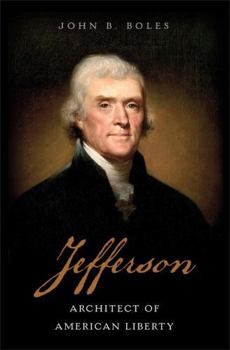Jefferson: Architect of American Liberty
Select Format
Select Condition 
Book Overview
From an eminent scholar of the American South, the first full-scale biography of Thomas Jefferson since 1970
Not since Merrill Peterson's Thomas Jefferson and the New Nation has a scholar attempted to write a comprehensive biography of the most complex Founding Father. In Jefferson, John B. Boles plumbs every facet of Thomas Jefferson's life, all while situating him amid the sweeping upheaval of his times. We meet Jefferson...
Format:Hardcover
Language:English
ISBN:0465094686
ISBN13:9780465094684
Release Date:April 2017
Publisher:Basic Books
Length:640 Pages
Weight:2.10 lbs.
Dimensions:1.9" x 6.3" x 9.4"
Customer Reviews
1 rating
Published by Thriftbooks.com User , 6 years ago
A breath of fresh air in Jeffersonian scholarship, "Jefferson: Architect of American Liberty" is balanced and broad. Late 20th century and early 21st century scholarship has given us highly biased, highly critical, and often narrowly scoped portraits of Jefferson. John Boles’ offering alleviates those concerns. This book is a cradle to grave biography that is “sympathetic but critical when appropriate.”
The author writes with boldness as he navigates error in recent Jeffersonian research. For example, in contrast to some Jeffersonian historians, Boles claims Jefferson actually had a close relationship with his mother and backs it up with adequate evidence. He takes on author Ron Chernow’s accusation of cowardice by Jefferson while he was governor of Virginia and even charges Chernow with intellectual dishonesty. He takes on Jefferson critic Joseph Ellis’ wild notion that Jefferson would have sided with the South in the Civil War. Boles teaches us that the Architect of American Liberty would have been horrified by that notion and by that war. Boles exposes author Henry Wiencek’s conclusion that Jefferson softened on slavery in his later years as pure fantasy.
There is one small detail that I especially appreciated in this book. Boles correctly slams the idea (indeed, propagated by the Hamilton Broadway Musical) that Jefferson's use of the word "men" in the Declaration of Independence meant only males. This is the height of intellectual dishonesty and is in fact revisionist history. For one to interpret the Declaration in that way is to show one's severe lack of literary exposure. Boles rightly points out that Jefferson's use of the word "men" is to refer to mankind which includes both men and women. By pointing this out, Boles exposes the blatant modern bias against Jefferson. It also exposes Boles for being an honest, bold, and informed writer and researcher.
Boles deals with the slavery paradox with precision and honesty. He shows us how and why we are disappointed with Jefferson in this area and teaches us how Jefferson could live with such a paradox. Boles helps us to think about how to judge the man by the man’s times, standards, and surroundings. The treatment of this subject in this book is extremely thoughtful, unbiased, and balanced; critical where criticism is due. Boles draws on extensive scholarship and offers satisfying conclusions about how to think about Jefferson in the context of slavery.
Of course, what would a book about Jefferson be without a detailed account of the brilliance of his mind, stock of his broad interests, and details about his beloved Monticello. All of that is here in detail. The stories of Jefferson’s time in Paris are highly interesting in this book. Boles also offers juicy family tales of knife fights, fireplace poker fights, and other wild stories. We follow Jefferson from his birth place at Shadwell then to Tuckahoe and on to the College of William and Mary. We follow him to Philadelphia where he becomes friends with the American greats such as Washington, Adams, Franklin, et al. We follow him to Paris and then to New York in the 1790's when the fierce political battles charge up. We see Jefferson rise to great fame as the author of the Declaration of Independence and as the President. We follow him back to Monticello where he lives for 17 more years enjoying a fruitful and eventful retirement.
There are a number of books about Jefferson, but this is the first one possibly since Merrill Peterson’s “A New Nation” that has attempted a comprehensive accounting of the life of Jefferson. This book details the many reasons why millions of people flock to Monticello, why a mountain has his face carved into the side of it, why he's on our money, why he began a university, and why a prominent memorial of him exists in our nation's capital. The author claims to “humanize and contextualize Jefferson without either deifying or demonizing him.” He has succeeded. This book is the modern day standa







